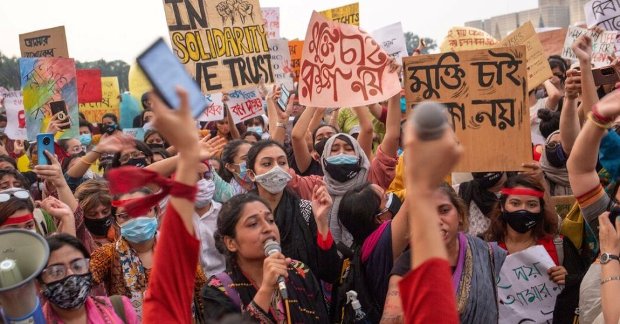Bangladesh to allow death penalty for rape convictions
By Megan Specia
DHAKA – The government of Bangladesh has approved measures to allow for the death penalty for rape, after several high-profile sexual assault cases set off widespread protests in recent weeks.
Khandker Anwarul Islam, the Bangladeshi Cabinet secretary, told reporters in a news conference Monday (12) that ministers had approved an amendment to the country’s existing law that would elevate the maximum punishment for rape to death, from life in prison.
A presidential declaration Tuesday (13) is expected to put the provision into law by amending the Women and Children Repression Prevention Act, officials said. Parliament is not in session because of the coronavirus pandemic.
Anisul Huq, the Bangladeshi minister for law, said Monday that the government hoped that the new measure would act as a deterrent and lead to a significant drop in rape cases. But rights groups have said that simply enacting harsher punishments for offenders is insufficient.
A series of harrowing attacks on women and young girls have focused attention on the problem of sexual violence.
In recent days, protests were held in Dhaka, the capital, and elsewhere, after a video of a woman being attacked by a group of men in the country’s southwest spread rapidly on Facebook.
Sultan Mohammed Zakaria, a South Asia researcher at Amnesty International, said in a statement released soon after the video was made public that the “truly disturbing footage demonstrates the shocking violence that Bangladeshi women are routinely being subjected to.”
But he also noted that it was part of a larger system of impunity for attackers.
“In the vast majority of these cases, the justice system fails to hold the perpetrators responsible,” he said in the statement. “There can be no excuses here — the Bangladeshi authorities must immediately launch a thorough and impartial investigation and bring those responsible for this vicious attack to justice through fair trials without recourse to the death penalty.”
After the most recent case, local and international rights groups were critical of the lack of accountability for attacks and minimal support for survivors, and urged the government to make meaningful changes.
This year, and also in response to large scale demonstrations, the country’s highest court ordered the government to set up a commission to investigate a steep rise in the number of rape cases being reported nationally.
Ain o Salish Kenya, a rights monitoring group in Bangladesh, has documented 975 instances of violent rape, based on media reports, but experts say that the number is most likely higher, as many go unreported.
Meenakshi Ganguly, the South Asia director at Human Rights Watch, said the introduction of the death penalty would do little to address the core issues and what she called an “epidemic” of rape cases.
“Apart from the fact that the capital punishment is inherently cruel and should be abolished, Bangladesh has to confront a much more basic problem — that it has a broken criminal justice system where survivors are unable to even approach the police with confidence, forget expect a successful prosecution,” she said.
She noted that conviction rates in cases of violence against women were “abysmally low,” and that there was no access to legal aid, medical care, safe shelter, witness protection, or psychological and social counselling for survivors of violent sexual assaults.
“The government should instead do the hard work to bring protection mechanisms and remove institutional barriers to justice,” she said.
Public reaction to the sentencing guidelines has been largely positive. Tahmid Binte Mahima, 21, a graduate student, said the measure was a “very welcome move,” as the possibility of a death sentence could act as a deterrent.
“Such harsh punishment will create fear among offenders,” she said. “But the more important thing is the strong implementation of law and the quick settling of cases. This needs to be ensured.”
-New York Times


